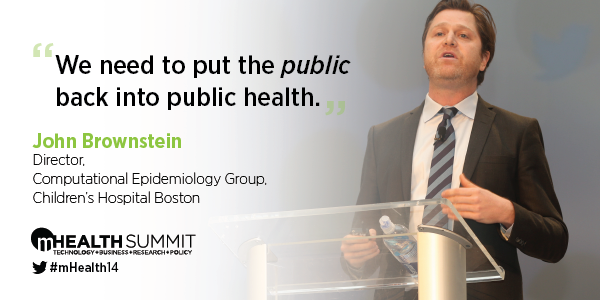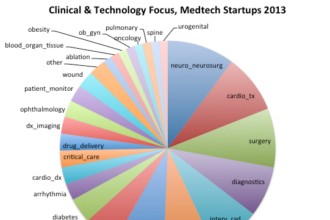“People will share about their diarrhea on Twitter but they won’t use an app called ‘Diarrhea Near Me” said John Brownstein, Director of the Computational Epidemiology Group at Children’s Hospital Boston and founder of HealthMap, on why patient reported outcomes alone won’t solve our data problems in healthcare.
“People will share about their diarrhea on Twitter but they won’t use an app called ‘Diarrhea Near Me” said John Brownstein, Director of the Computational Epidemiology Group at Children’s Hospital Boston and founder of HealthMap, on why patient reported outcomes alone won’t solve our data problems in healthcare.
The third day of the M-Health conference coincided with the first day of the Global MHealth Forum, and the keynote presented the most aspirational view of the three conference keynotes.

HealthMap, which was recently acquired by Booz Allen, focuses on mining public data to predict epidemics and to chart the course of infectious diseases. We’ve seen this before with Google Flu Trends, but HealthMap goes beyond what people are searching for crawls over 200,000 websites globally including social media networks, news, government sites. HealthMap uses natural language processing to take it a step further by comparing this data to satellite images to see whether quarantine is working. While HealthMap considers itself a public data set for health, Brownstein is clear that partnerships with private sector are the only way to scale health programs, and that these programs must have a business model. Texting for health scenarios that partner with carriers are a good match. The carriers are looking for new customers, and SMS programs have proven to be very effective in developing countries. In a twist on that model, Orange partnered on a program in Liberia where health workers got free data access to any government health information sites and then used their own data for Facebook and Twitter, capitalizing on human nature that while we might buy our devices for work we spend a lot of time goofing around on them.
Validating Clinical Data To Reinvent Medicine
The second half of the keynote was a panel discussion focused more on how to deal with all of the medical data coming in, and reflected some of the concern and disappointment with sensors and quantified self movement. Even though the hype and funding for these activity tracker and sensor companies does not seem to have cooled off, there are a few issues that the healthcare industry has identified:
- Too much data that we can’t make sense of. We haven’t previously been capable of tracking people’s vital signs 24/7 during daily life so it’s impossible to know what a “normal” data set looks like.
- The novelty of trackers wears off after you calibrate. We’ve written about this before. Once you know how many steps something is or how many calories you’re burning, you don’t need to keep wearing the tracker.
Of course, there is also the often-cited issue of doctors not having the time, interest, or financial incentives to look at all this data.
The solution was to look at tracking in context of a care path or a specific issue, and to figure out how to provide insight along with the data both for the consumer and for the healthcare provider. Panelist Bryan Sivak, CTO of the US Department of Health and Human Services said he didn’t just want to know that he slept poorly but why he slept poorly. Sivak also outlined what he saw as the barriers to MHealth really taking off:
- Questions of data ownership
- Privacy and data protection issues
- Standards of care
- Incentives for providers
- Design for clinician workflow
None of these are particularly new or daunting, which again points to the need for solid implementation and adoption evidence from m-health vendors.
James Levine, Professor of Medicine at the Mayo Clinic, wanted more thought put into what data we use and why, and provide the example that many over the counter blood pressure readings are not valid. Levine would like mobile health applications evaluated by the following criteria.
- What is the medical benefit?
- Is it cost-effective? What is the return on investment?
- Is data interoperable? Is data protected?
- Can you analyze the data the application collects?
- Can you take action if you need to address something based on patient entered data?
- How is it reimbursed?
- Is it constantly improving based on patient input?
Teri Pipe, Dean of ASU College of Nursing, and as the moderator pointed out the only nurse on a panel at the conference, said that the promise of m-health is being able to know when to bring a patient into a clinic for treatment, and allowing them to stay at home when they want it. We would add to that, how do you help them manage when they are at home. She also felt that mobile health held great promise in the hands of nurses who can prevent ER visits from the field while being connected to the healthcare system via mobile. Teri used the example of fire departments having nurses on staff to treat minor trauma and injury onsite rather than sending people to the ER.
This was our first MHealth Summit, although it was the 6th annual, so we can’t compare to previous years. It seems like the overall tone was of cautious optimism. Attendees, panelists, and presenters all firmly believed in the promise of mHealth but there was not enough demostratable evidence, and certainly not enough examples of health systems, payers, and m-health companies overcoming the barriers we have in the market. Hopefully, as the first day keynote asked, 2015 will be the breakout year for MHealth, and we’ll see more success stories, ROI, and clinical validation at the summit next year.
Choosing the Right mHealth Tools for the Job

Anne Weiler is CEO and co-founder of Wellpepper, a clinically-validated and award winning platform for patient engagement that enables health systems to track patient outcomes in real-time against their own protocols and personalize treatment plans for patients. Wellpepper patients are over 70% engaged. Prior to Wellpepper, Anne was Director of Product Management at Microsoft Corporation.







